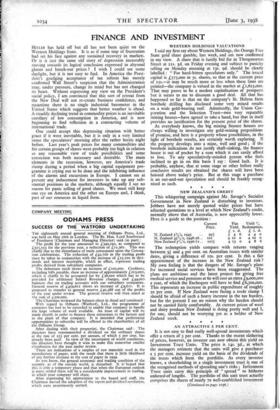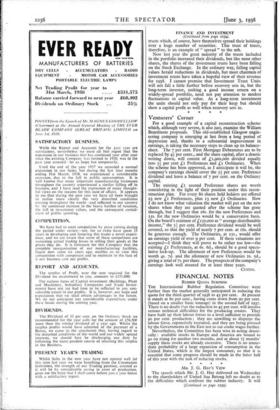FINANCE AND INVESTMENT
HITLER has held off but all has not been quiet on the Western Holdings front. It is as if some imp of frustration had set his face against any sustained recovery in markets. Or is it just the same old story of depression inexorably moving towards its logical conclusion expressed in abysmal gloom and knock-out prices ? I wish I could see some daylight, but it is not easy to find. In America the Presi- dent's grudging acceptance of tax reform has merely confirmed Wall Street's suspicion that the Administration may, under pressure, change its mind but has not changed its heart. Without expressing any view on the President's social policy, I am convinced that this sort of retreat from the New Deal will not re-create business confidence, and meantime there is no single industrial barometer in the United States which suggests that better weather is ahead. A steadily declining trend in commodity prices is an inevitable corollary of low consumption in America, and is now beginning to find reflection in a contracting volume of international trade.
One could accept this depressing situation with better grace if it were inevitable, but it is only in a very limited sense the speculators' morning after the rather hectic night before. Last year's peak prices for many commodities and for certain groups of shares were probably too high in relation to any reasonable view of trade possibilities and some correction was both necessary and desirable. The main elements in the recession, however, are America's trade slump during a period when a big capital equipment pro- gramme is crying out to be done and the inhibiting influence of the alarms and excursions in Europe. I cannot see at present any inducement for investors to take up any sub- stantial positions in the markets, although equally I see no reason for panic selling of good shares. We must still keep one eye on America and the other on Europe and, I think, part of our resources in liquid form.
WESTERN HOLDINGS VALUATIONS
I said my first say about Western Holdings, the Orange Free State gold share gamble, last week, and am now confirmed in my view. A share that is lustily bid for in Throgmorton Street at 21s. 3d. on Friday evening and subject to panicky selling on Monday morning at 13s. 9d. should be clearly labelled : " For hard-bitten speculators only." The isstml capital is £575,000 in 5s. shares, so that at the current price of t5s.—it may be much more or less when these lines are printed—the company is valued in the market at £1,625,000. That may prove to be a modest capitalisation of prospects but it seems to me to discount a good deal. All that has happened so far is that on the company's St. Helena farm borehole drilling has disclosed some very mixed results on a wide gold-bearing reef. Admittedly, the Union Cor- poration and the Selection Trust—two very reputable mining houses—have agreed to take a hand, but that in itself provides no justification for the present price of the shares.
As everybody knows, the big mining finance houses are always willing to investigate any gold-mining propositions of promise, and here is a property whose possibilities, in the light of borehole results, are certainly worth exploring. If the property develops into a mine, well and good ; if the borehole indications do not justify shaft-sinking, the finance house is out of pocket by a sum which it can easily afford to lose. To any speculatively-minded person who feels inclined to go in on this basis I say : Good luck. It is probable, anyhow, that at some stage or other before really conclusive results are obtained the shares will have been hoisted above today's price. But at this stage a purchase is an out-and-out speculation and should be frankly recog- nised as such. * *
NEW ZEALAND'S CREDIT
This whispering campaign against Mr. Savage's Socialist Government in New Zealand is disturbing to investors. Jobbers have not merely quoted wider prices but have adjusted quotations to a level at which New Zealand's credit, normally above that of Australia, is now appreciably lower. Here is a guide to the position :
Current Flat Yield Price. Yield. Redemption.
L s. d. L s. d.
N. Zealand 3%'s, 1945 • • 931 3 4
6 4 4 0 N. Zealand 41%'s, 1948-58- 101 ,
410
0
410 0
New Zealand 5%'s, 1956-71.. ton
4 1 3
0
4 8 6
The redemption yields compare with returns ranging between 3i and 4 per cent. on Australian issues with similar dates, giving a difference of los. per cent. Is this a fair appraisement of the increase in the New Zealand risk ? My own feeling is that the dangers of Mr. Savage's plans for increased social services have been exaggerated. The plans are ambitious and the latest project for giving free medical service and pensions at 6o will cost an extra £9,000,000 a year, of which the Exchequer will have to find £6,500,000. This represents an increase in public expenditure of roughly 20 per cent. If New Zealand were facing a trade slump I should be afraid of such a heavy increase in the tax burden, but for the present I see no reason why the burden should not be carried fairly comfortably. At current prices of wool and dairy produce New Zealand is doing pretty well and I, for one, should not be worrying yet as a holder of New Zealand stock. * *
AN ATTRACTIVE 5 PER CENT.
It is not easy to find really well-spread investments- which offer a return of 5 per cent. Thanks to the recent slithering of prices, however, an investor can now obtain this yield on Investment Trust Units. The price is 14s. 3d., at which the managers estimate that the units will give a purchaser a 5 per cent. increase yield on the basis of the dividends of the trusts which form the portfolio. As every investor knows, a shareholding in a single investment trust is one of the recognised methods of spreading one's risks ; Investment Trust units carry this principle of " spread " to hitherto unheard-of lengths. The portfolio of this unit trust actually comprises the shares of nearly 7o well-established investment
(Continued on page 1036.) FINANCE AND INVESTMENT
(Continued from page 1034) trusts which, of course, have themselves spread their holdings over a huge number of securities. This trust of trusts, therefore, is an example of " spread " to the nth.
Now last year the great majority of the trusts included in the portfolio increased their dividends, but like most other shares, the shares of the investment trusts have been falling on the Stock Exchange: In the ordinary way, falling capital values herald reductions in dividends, but most chairmen of investment trusts have taken a hopeful view of their revenue for 1938. I cannot promise that Investment Trust Units will not fall a little further before recovery sets in, but the long-term investor, seeking a good income return on a widely-spread portfolio, need not pay attention to modest fluctuations in capital value. As a long-term investment the units should not only pay for their keep but should show a capital profit as well when recovery sets in.



















































 Previous page
Previous page